Best Nootropic Brain Supplements

Nootropic Brain Supplements: A Deep Dive into Cognitive Enhancement
Nootropic brain supplements, often hailed as “smart drugs” or “cognitive enhancers,” are substances designed to boost cognitive functions such as memory, focus, creativity, motivation, and overall brain health. These supplements can be natural, synthetic, or a combination of both. They appeal to a wide range of individuals, including students, professionals, and seniors, all seeking to optimize their mental performance. As the demands of modern life increase, so does the interest in and consumption of these brain-boosting compounds. Therefore, understanding the landscape of nootropic brain supplements is essential for anyone looking to enhance their cognitive abilities safely and effectively.
What are Nootropics? Defining Cognitive Enhancement
The term “nootropic,” derived from the Greek words “nous” (mind) and “trope” (to turn), was coined in 1972 by Romanian psychologist and chemist Corneliu Giurgea. He defined nootropics as substances that enhance learning and memory, protect the brain from injury, and have few side effects. However, the modern understanding of nootropics has broadened to encompass a wider range of substances with varying degrees of efficacy and safety.
Types of Nootropics: Natural vs. Synthetic
Nootropics can broadly be classified into two main categories: natural and synthetic.
Natural Nootropics: These are derived from natural sources such as plants, herbs, and nutrients found in food. Examples include:
Bacopa Monnieri: A traditional Ayurvedic herb known for improving memory and reducing anxiety.

View Product
Lion’s Mane Mushroom: A medicinal mushroom that promotes nerve growth factor (NGF) production, supporting brain cell health.

View Product
Rhodiola Rosea: An adaptogenic herb that reduces fatigue and enhances mental performance, especially during stressful times.

View Product
Ginkgo Biloba: A plant extract that improves blood flow to the brain, enhancing memory and cognitive function.

View Product
Caffeine + L-Theanine: A popular combination that provides alertness and focus without the jitters often associated with caffeine alone. L-Theanine promotes relaxation.
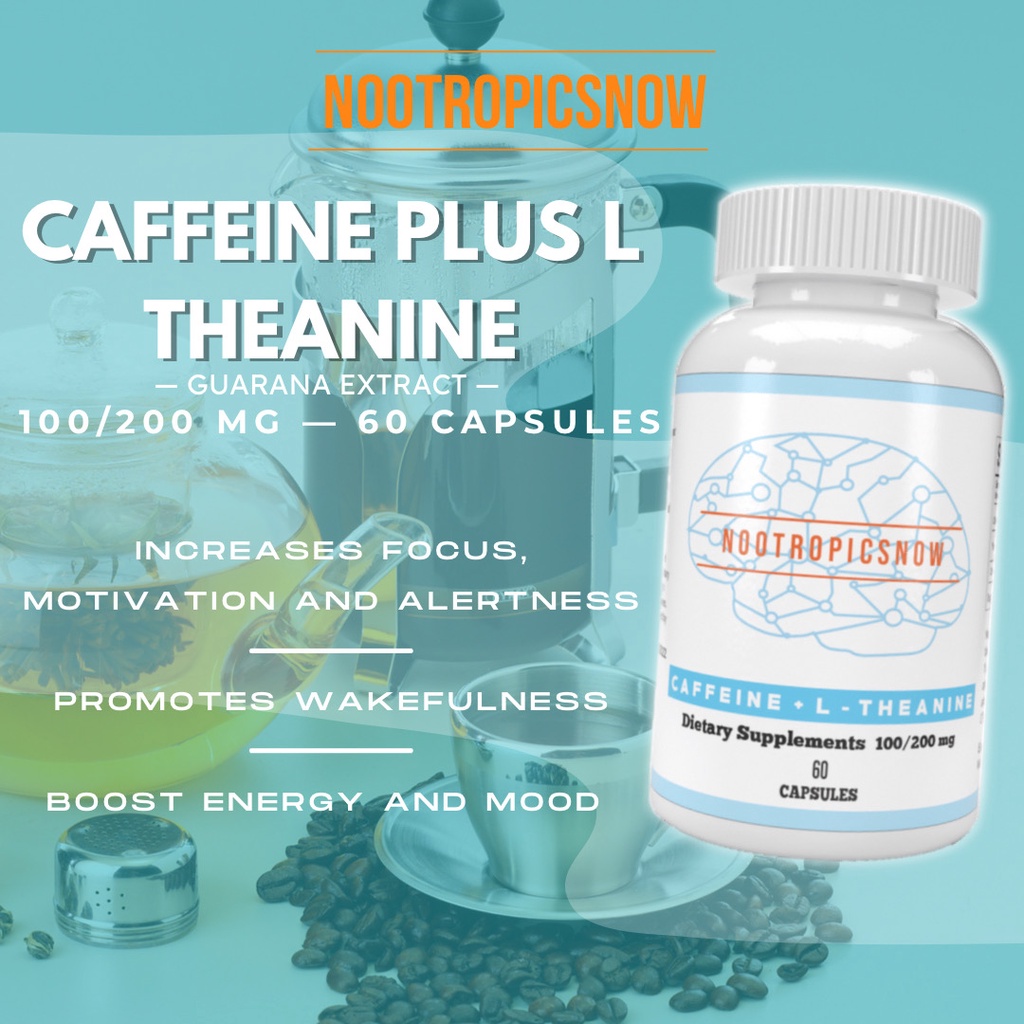
View Product-(60-capsules-30-servings)-Nootropic-Brain-Booster-i.202321183.4251327469)
Synthetic Nootropics: These are created in a laboratory and are often more potent and targeted in their effects compared to natural nootropics. Examples include:
Piracetam: The original nootropic, developed by Giurgea, used to enhance memory and learning.
Aniracetam: A more potent derivative of piracetam with anxiolytic (anti-anxiety) effects.
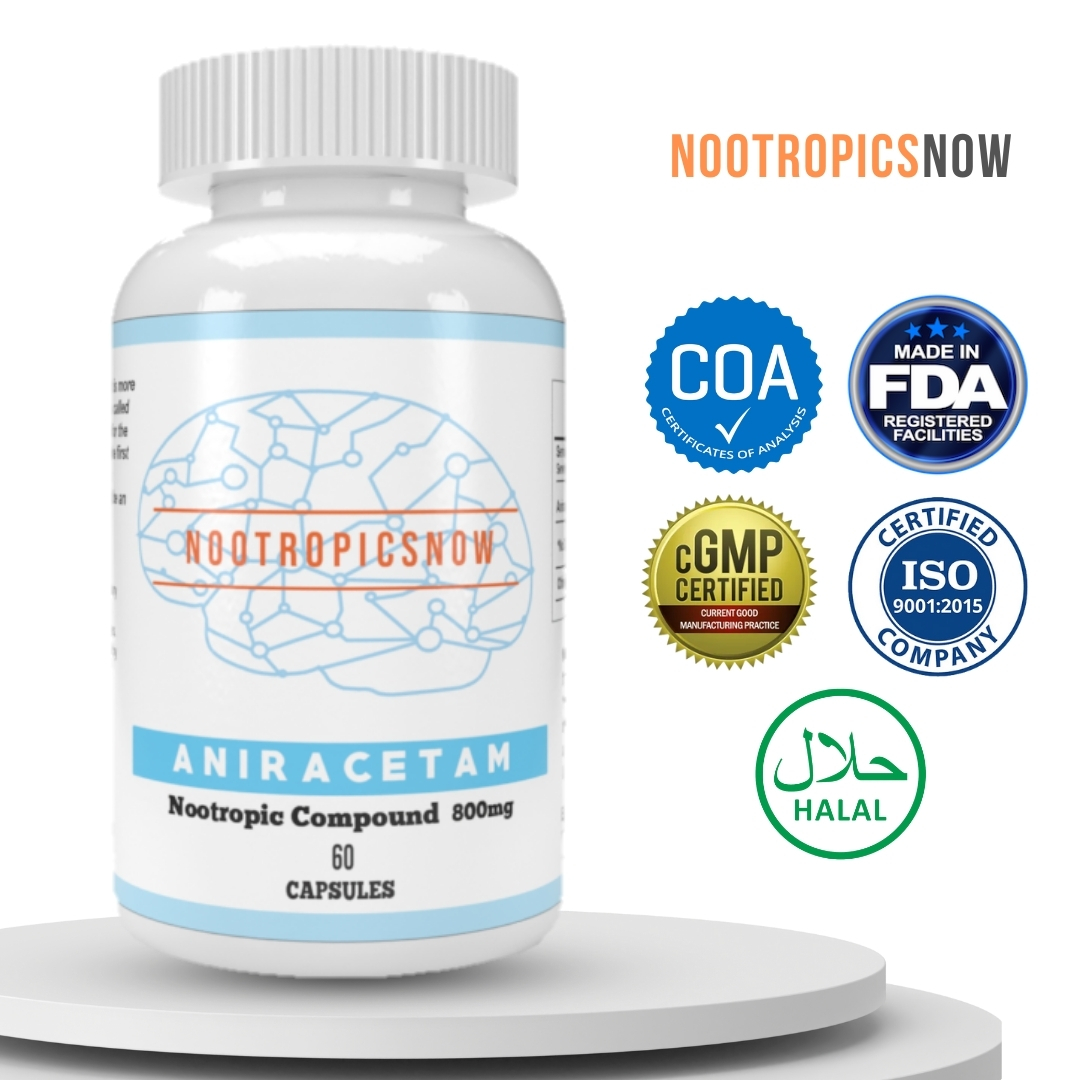
View Product
Oxiracetam: Known for its stimulating effects and potential to improve logical thinking.

View Product
Pramiracetam: A highly potent racetam that enhances memory and focus.
Noopept: A synthetic peptide that is structurally similar to piracetam but much more potent.
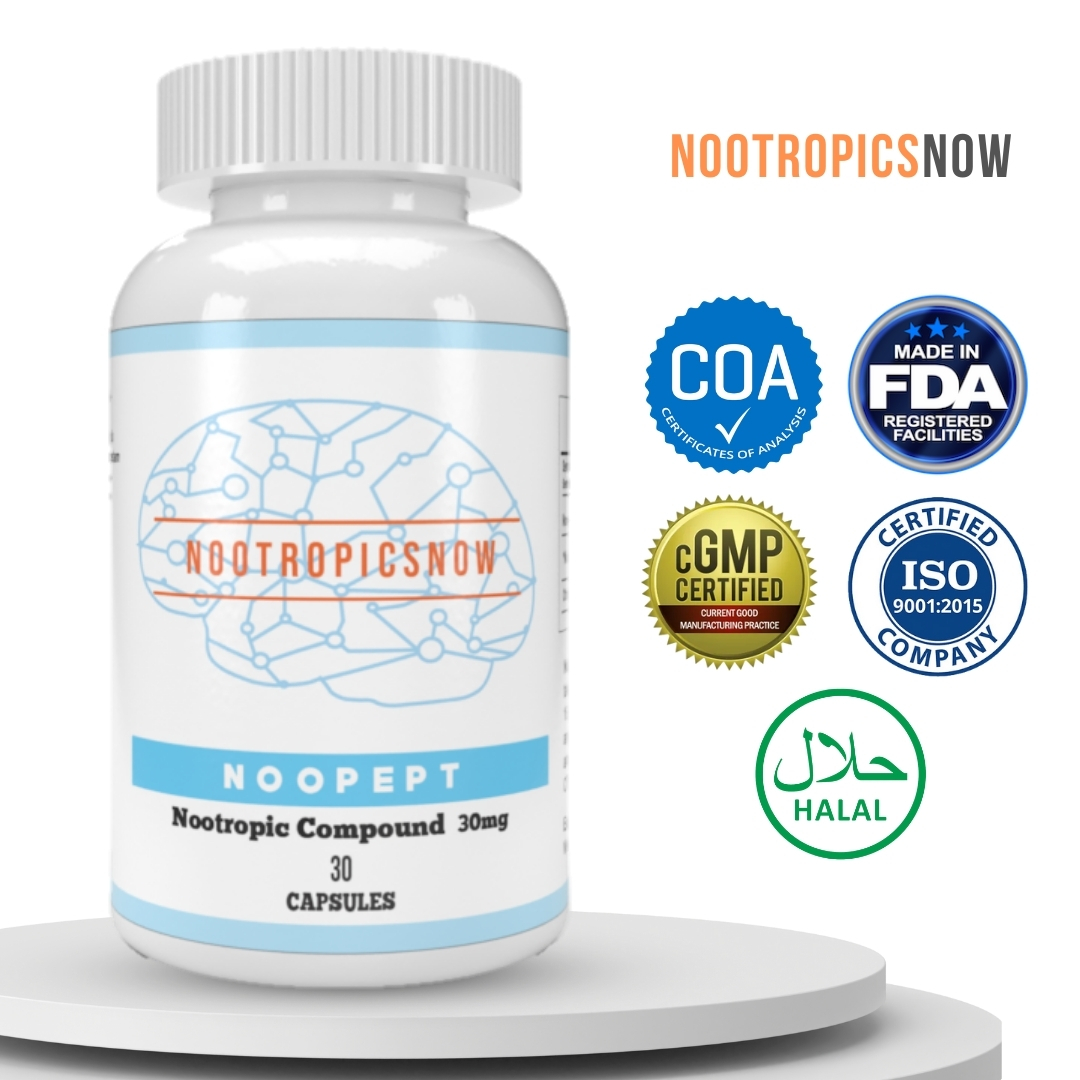
View Product
Modafinil: A wakefulness-promoting agent that enhances focus and cognitive performance. (Often requires a prescription in many regions).
CDP-Choline (Citicoline): A naturally occurring chemical in the body that helps protect brain cell membranes. It is also synthesized for supplemental purposes.
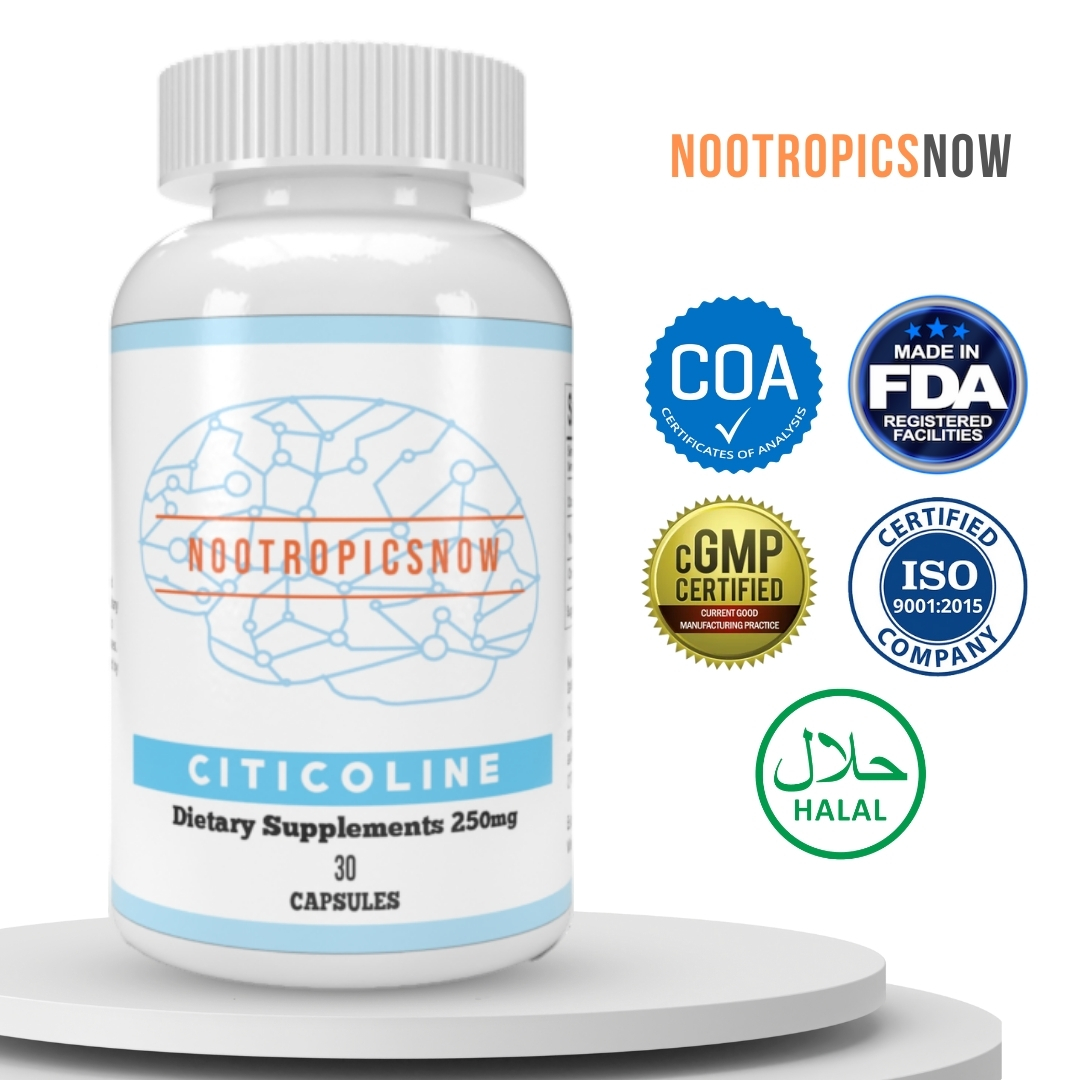
View Product
Alpha-GPC: Another choline source that aids in acetylcholine production, which is crucial for learning and memory.

View Product
Mechanisms of Action: How Nootropics Work
Nootropics exert their effects through various mechanisms, depending on the specific substance. These mechanisms include:
Neurotransmitter Modulation: Many nootropics affect the levels and activity of neurotransmitters in the brain, such as acetylcholine, dopamine, serotonin, and glutamate. Acetylcholine is crucial for memory and learning, while dopamine is involved in motivation and reward.
Increased Cerebral Blood Flow: Some nootropics improve blood circulation to the brain, ensuring that brain cells receive adequate oxygen and nutrients.
Neuroprotection: Certain nootropics protect brain cells from damage caused by oxidative stress, inflammation, and toxins.
Enhanced Neuroplasticity: Neuroplasticity refers to the brain’s ability to reorganize itself by forming new neural connections. Nootropics can enhance neuroplasticity, improving learning and memory.
Improved Brain Energy Metabolism: Nootropics can enhance energy production within brain cells, leading to improved cognitive function.
The Benefits of Nootropic Brain Supplements: What Can They Do For You?
Nootropic brain supplements offer a range of potential benefits, making them attractive to individuals seeking to enhance their cognitive abilities. However, it’s crucial to remember that the effects can vary depending on the individual, the specific nootropic, and the dosage.
Key Cognitive Benefits
Improved Memory: Many nootropics, such as Bacopa Monnieri, Piracetam, and CDP-Choline, are known for their memory-enhancing properties. They can improve both short-term and long-term memory.
Enhanced Focus and Attention: Nootropics like Modafinil, L-Theanine, and Rhodiola Rosea can improve focus and attention, making it easier to concentrate on tasks for extended periods.
Increased Mental Energy: Certain nootropics, such as caffeine and Rhodiola Rosea, can boost mental energy and reduce fatigue.
Reduced Anxiety and Stress: Some nootropics, such as L-Theanine and Bacopa Monnieri, have anxiolytic (anti-anxiety) effects, helping to reduce stress and promote relaxation.
Improved Mood: Nootropics like L-Theanine and Rhodiola Rosea can help improve mood and reduce symptoms of depression.
Enhanced Creativity: While not all nootropics directly enhance creativity, some can improve focus and mental clarity, which can indirectly boost creative thinking.
Neuroprotection: Certain nootropics, such as Lion’s Mane Mushroom and Ginkgo Biloba, protect the brain from damage and support long-term brain health.
Specific Applications: Who Can Benefit?
Students: Nootropics can help students improve focus, memory, and learning ability, leading to better academic performance.
Professionals: Nootropics can enhance productivity, creativity, and problem-solving skills, helping professionals excel in their careers.
Seniors: Nootropics can help maintain cognitive function and protect against age-related cognitive decline.
Athletes: Nootropics can improve focus, reaction time, and mental endurance, enhancing athletic performance.
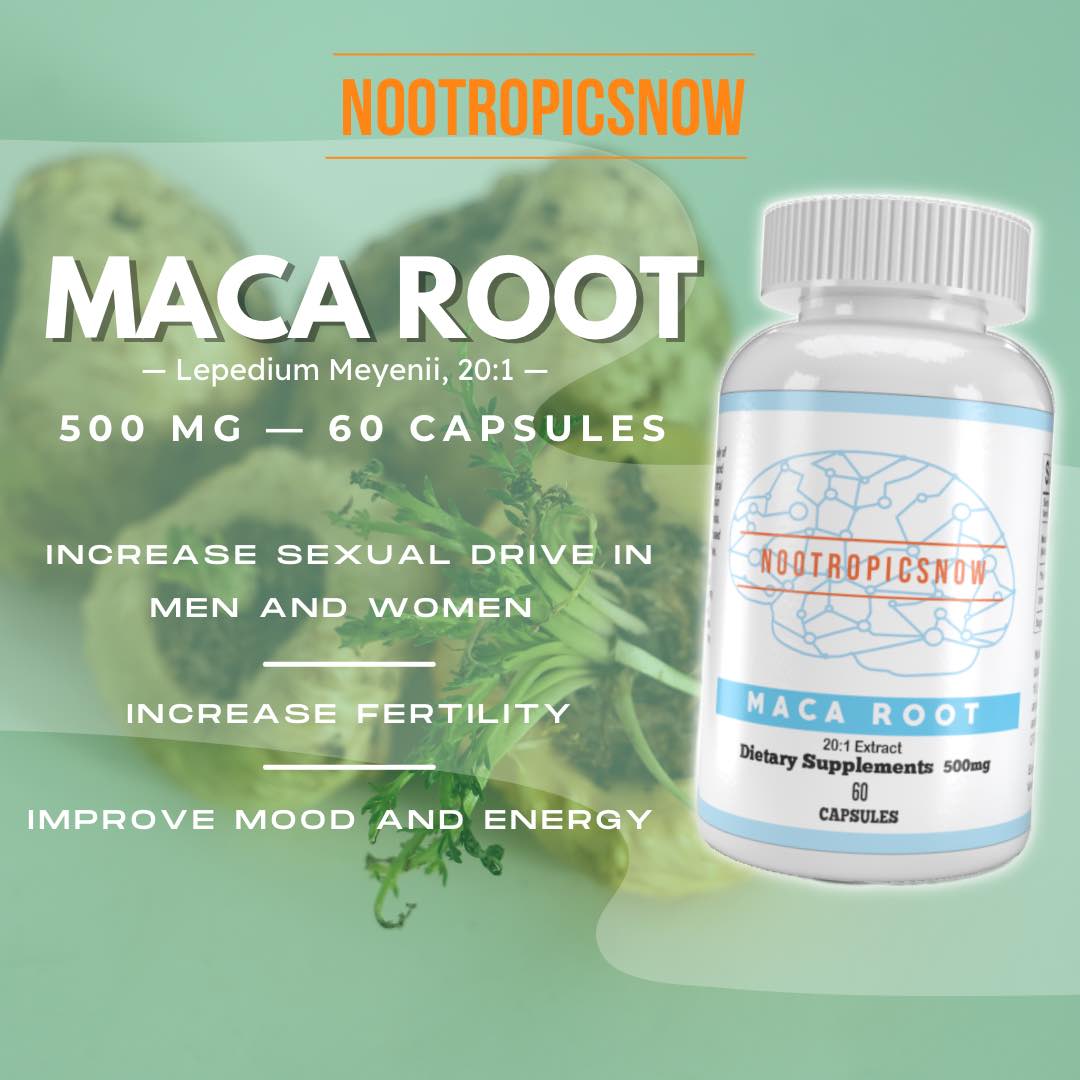
View Product
Individuals with ADHD: Certain nootropics, such as L-Theanine and Rhodiola Rosea, can help manage symptoms of ADHD, such as inattention and impulsivity.
Popular Nootropic Brain Supplements: A Closer Look
With a vast array of nootropic brain supplements available, it’s essential to understand the specific benefits and potential risks of each substance. Here’s a closer look at some of the most popular nootropics:
1. Bacopa Monnieri: The Ancient Memory Booster
Description: Bacopa Monnieri is a traditional Ayurvedic herb that has been used for centuries to enhance memory and cognitive function.
Mechanism of Action: Bacopa Monnieri contains active compounds called bacosides, which enhance neurotransmitter activity, protect brain cells from damage, and improve blood flow to the brain.
Benefits: Improved memory, reduced anxiety, enhanced focus, and neuroprotection.
Dosage: Typically taken in doses of 300-600mg per day.
Side Effects: Mild side effects such as nausea, stomach cramps, and diarrhea may occur in some individuals.
2. Lion’s Mane Mushroom: The Brain’s Best Friend
Description: Lion’s Mane Mushroom is a medicinal mushroom that promotes nerve growth factor (NGF) production, supporting brain cell health.
Mechanism of Action: Lion’s Mane Mushroom contains compounds called hericenones and erinacines, which stimulate the synthesis of NGF.
Benefits: Improved memory, enhanced focus, neuroprotection, and reduced anxiety.
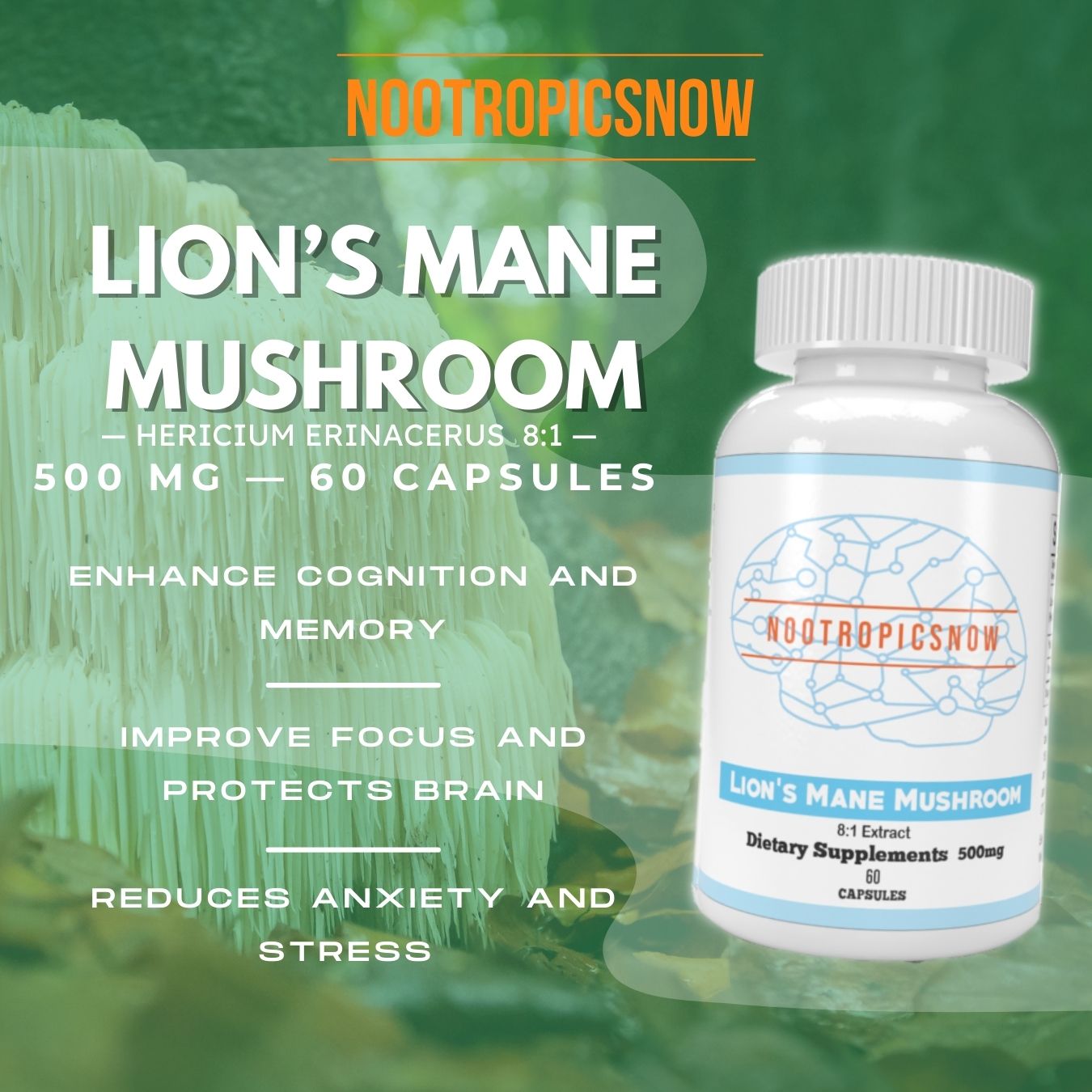
View Product
Dosage: Typically taken in doses of 500-3000mg per day.
Side Effects: Generally well-tolerated, with few reported side effects.
3. Rhodiola Rosea: The Stress Buster
Description: Rhodiola Rosea is an adaptogenic herb that reduces fatigue and enhances mental performance, especially during stressful times.
Mechanism of Action: Rhodiola Rosea contains compounds called rosavin and salidroside, which modulate neurotransmitter levels, reduce cortisol (stress hormone) levels, and protect brain cells from damage.
Benefits: Reduced fatigue, enhanced mental performance, improved mood, and reduced anxiety.
Dosage: Typically taken in doses of 100-600mg per day.
Side Effects: Mild side effects such as dizziness, insomnia, and dry mouth may occur in some individuals.
4. L-Theanine: The Relaxing Focus Enhancer
Description: L-Theanine is an amino acid found in green tea that promotes relaxation and reduces anxiety without causing drowsiness.
Mechanism of Action: L-Theanine increases alpha brain wave activity, which is associated with relaxation and focus. It also modulates neurotransmitter levels, such as GABA and dopamine.
Benefits: Reduced anxiety, enhanced focus, improved mood, and better sleep quality.

View Product
Dosage: Typically taken in doses of 100-400mg per day.
Side Effects: Generally well-tolerated, with few reported side effects.
5. Caffeine and L-Theanine Stack: The Perfect Combo
Description: A combination of caffeine, a stimulant, and L-Theanine, an amino acid, that provides alertness and focus without the jitters often associated with caffeine alone.
Mechanism of Action: Caffeine stimulates the central nervous system, increasing alertness and focus. L-Theanine promotes relaxation and reduces anxiety, counteracting the negative effects of caffeine.
Benefits: Increased alertness, enhanced focus, improved mood, and reduced anxiety.
Dosage: Typically taken in a ratio of 1:2 (e.g., 100mg caffeine and 200mg L-Theanine).
Side Effects: Can cause anxiety, insomnia, and stomach upset in some individuals.
6. CDP-Choline (Citicoline): The Brain Cell Protector
Description: A naturally occurring chemical in the body, and can be synthesized, that supports the production of phosphatidylcholine, a major building block of brain cell membranes.
Mechanism of Action: CDP-Choline helps to maintain the integrity of brain cell membranes and supports the synthesis
Exploring Nootropic Brain Supplements: Cognitive Enhancement Unveiled
Nootropic brain supplements, often marketed as “smart drugs” or “cognitive enhancers,” represent a diverse category of substances aimed at improving various aspects of cognitive function. These supplements can range from naturally derived compounds to synthetically produced pharmaceuticals, each with its unique mechanism of action and potential benefits. The growing popularity of nootropics reflects an increasing interest in optimizing mental performance and enhancing overall brain health. Therefore, understanding the nuances of these supplements is crucial for making informed decisions about their use.
Understanding Nootropics: A Deeper Dive
The term “nootropic,” coined in 1972 by Romanian psychologist and chemist Corneliu Giurgea, originally referred to substances that met specific criteria, including enhancing memory and learning, protecting the brain from injury, and possessing minimal side effects. However, the contemporary understanding of nootropics has broadened to encompass a wide range of compounds with varying degrees of efficacy and safety profiles. These substances are designed to influence cognitive processes, such as attention, memory, creativity, and motivation.
Classification of Nootropics
Nootropics can be classified into several categories based on their origin and mechanism of action:
Natural Nootropics: These are derived from plants, herbs, or other natural sources. Examples include Bacopa monnieri, Ginkgo biloba, and Lion’s Mane mushroom. These compounds often have a long history of use in traditional medicine and are generally considered safe, although scientific evidence supporting their efficacy can vary.

View Product

View Product
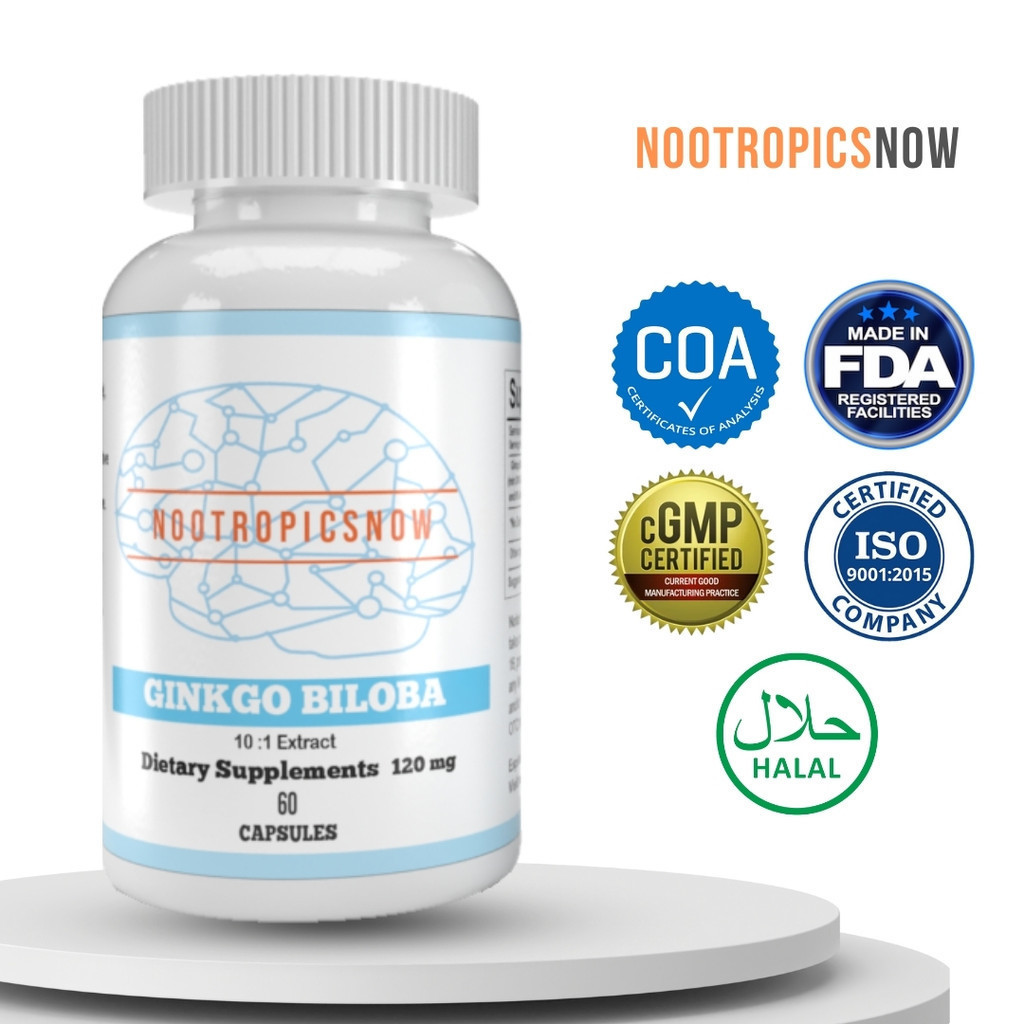
View Product
Synthetic Nootropics: These are created in a laboratory and include compounds like piracetam, aniracetam, and other members of the racetam family. These nootropics are often more potent than their natural counterparts, but their long-term safety and efficacy are still under investigation.
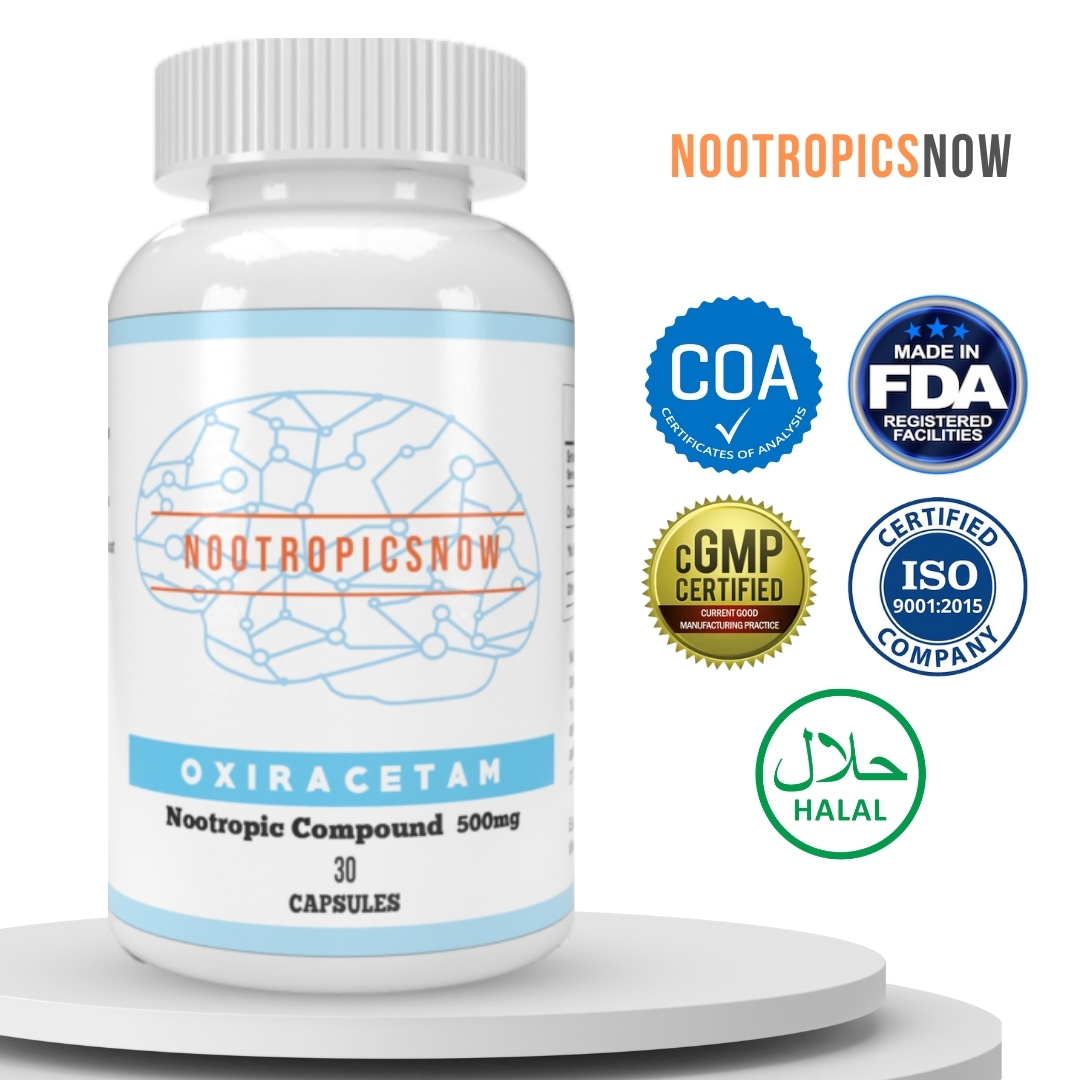
View Product

View Product
Pharmaceutical Nootropics: These are prescription drugs that are primarily used to treat cognitive disorders but may also be used off-label to enhance cognitive function in healthy individuals. Examples include Modafinil and methylphenidate (Ritalin). These drugs are typically more potent and have a higher risk of side effects than other types of nootropics.
Nutrients and Dietary Supplements: Certain vitamins, minerals, and other nutrients play a crucial role in brain health and cognitive function. Examples include omega-3 fatty acids, B vitamins, and choline. While not strictly considered nootropics, these nutrients are essential for optimal brain performance.
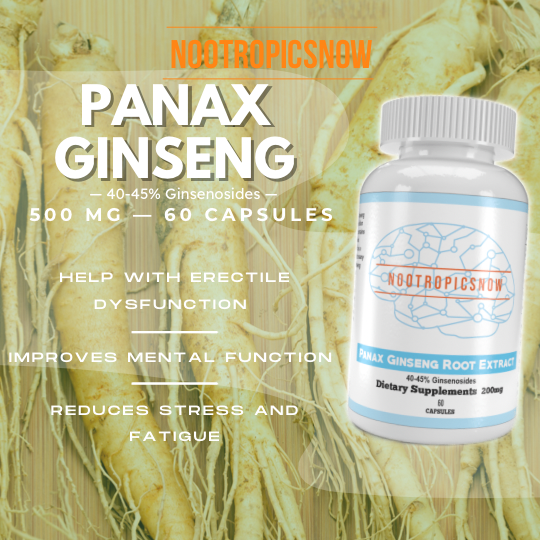
View Product
Mechanisms of Action: How Nootropics Work
Nootropics exert their cognitive-enhancing effects through various mechanisms of action, including:
Neurotransmitter Modulation: Many nootropics influence the levels of neurotransmitters, such as acetylcholine, dopamine, serotonin, and GABA, which play a crucial role in cognitive processes.
Increased Cerebral Blood Flow: Some nootropics enhance blood flow to the brain, delivering more oxygen and nutrients to brain cells, which can improve cognitive function.
Neuroprotection: Certain nootropics have antioxidant and anti-inflammatory properties, protecting brain cells from damage caused by oxidative stress and inflammation.
Synaptic Plasticity: Some nootropics promote synaptic plasticity, the brain’s ability to form new connections between neurons, which is essential for learning and memory.
Brain Energy Metabolism: Certain nootropics help in improving glucose metabolism and increasing nerve growth factor (NGF) to encourage brain cell formation, maintenance, and repair. This enhances the energy available to brain cells.
Popular Nootropic Brain Supplements: A Closer Look
Several nootropic brain supplements have gained popularity due to their purported cognitive-enhancing effects. These include:
1. Bacopa Monnieri
Bacopa monnieri is an herb traditionally used in Ayurvedic medicine to enhance memory and learning. It contains active compounds called bacosides, which are believed to protect brain cells from damage and improve neurotransmitter function.
Benefits:
Improved memory and recall
Enhanced cognitive performance
Reduced anxiety and stress
Dosage: Typically, 300-450mg of a standardized extract containing 50% bacosides is recommended.

View Product
2. Lion’s Mane Mushroom
Lion’s Mane (Hericium erinaceus) is an edible mushroom that contains compounds called hericenones and erinacines, which stimulate nerve growth factor (NGF) production in the brain. NGF plays a crucial role in the growth, maintenance, and survival of brain cells.
Benefits:
Improved memory and cognitive function
Enhanced focus and concentration
Neuroprotective effects
Dosage: Dosage varies, but a typical range is 500-1000mg per day.

View Product
3. Rhodiola Rosea
Rhodiola rosea is an adaptogenic herb that helps the body cope with stress. It contains active compounds called rosavins and salidroside, which are believed to enhance mental performance, reduce fatigue, and improve mood.
Benefits:
Reduced stress and fatigue
Improved mental performance
Enhanced mood
Dosage: A typical dosage is 200-600mg per day.

View Product
4. L-Theanine
L-Theanine is an amino acid found in green tea. It promotes relaxation without causing drowsiness and can enhance focus and attention when combined with caffeine.
Benefits:
Reduced anxiety and stress
Improved focus and attention
Enhanced relaxation
Dosage: A typical dosage is 100-200mg per day.

View Product
5. Caffeine
Caffeine is a stimulant that increases alertness and improves focus. It works by blocking adenosine receptors in the brain, which reduces drowsiness and increases dopamine levels.
Benefits:
Increased alertness
Improved focus
Enhanced energy levels
Dosage: A typical dosage is 100-200mg per day. Excessive intake should be avoided to prevent side effects such as anxiety and insomnia.
6. Citicoline
Citicoline (CDP-Choline) is a naturally occurring compound that serves as a precursor to phosphatidylcholine, a major component of brain cell membranes. It supports brain health and may enhance cognitive function, particularly memory and attention.
Benefits:
Improved memory and learning
Enhanced cognitive performance
Neuroprotective effects
Dosage: A typical dosage is 250-500mg per day.

View Product
7. Creatine
Creatine, often associated with muscle building, also plays a role in brain energy metabolism. It helps regenerate ATP, the primary energy source for cells, including brain cells.
Benefits:
Improved memory and cognitive function
Enhanced mental performance
Neuroprotective effects
Dosage: A typical dosage is 3-5 grams per day.
8. Omega-3 Fatty Acids
Omega-3 fatty acids, particularly EPA and DHA, are essential for brain health. They support brain cell structure and function and have been linked to improved memory, mood, and cognitive performance.
Benefits:
Improved memory and cognitive function
Enhanced mood
Neuroprotective effects
Dosage: A typical dosage is 1-3 grams per day.
Safety and Side Effects of Nootropic Brain Supplements
While many nootropic brain supplements are generally considered safe, it’s crucial to be aware of potential side effects and risks:
Individual Variability: The effects of nootropics can vary significantly from person to person. What works well for one individual may not work for another, and some people may experience side effects that others do not.
Dosage Considerations: Taking too much of a nootropic can increase the risk of side effects. It’s important to start with a low dose and gradually increase it as needed.
Interactions with Medications: Nootropics can interact with certain medications, so it’s crucial to consult with a healthcare professional before taking them if you are on any prescription drugs.
Quality Control: The quality of nootropic supplements can vary widely. It’s essential to purchase products from reputable manufacturers that have been third-party tested for purity and potency.
Long-Term Effects: The long-term effects of many nootropics are not well-understood. More research is needed to determine the safety and efficacy of these supplements over extended periods.
Dependence and Tolerance: Some nootropics, particularly stimulants like caffeine, can lead to dependence and tolerance. This means that you may need to take increasingly higher doses to achieve the same effects, and you may experience withdrawal symptoms if you stop taking them.
Specific Side Effects:
Bacopa Monnieri: May cause digestive upset in some individuals.
Lion’s Mane Mushroom: Generally well-tolerated, but some people may experience mild digestive issues.
Rhodiola Rosea: May cause insomnia or anxiety in some individuals.
L-Theanine: Generally safe, but some people may experience mild headaches.
Caffeine: Can cause anxiety, insomnia, and digestive upset in some individuals.
Citicoline: Generally well-tolerated, but some people may experience mild digestive issues.
Considerations Before Using Nootropic Brain Supplements
Before starting any nootropic brain supplement regimen, consider the following:
Consult with a Healthcare Professional: Talk to your doctor or other healthcare provider to discuss your goals and any underlying health conditions.
Do Your Research: Learn as much as you can about the nootropics you are considering, including their mechanisms of action, benefits, side effects, and interactions.
Start Slow: Begin with a low dose and gradually increase it as needed.
Monitor Your Progress: Keep track of how you are feeling and any changes in your cognitive function.
Be Patient: It may take several weeks or months to see the full effects of some nootropics.
Prioritize Lifestyle Factors: Nootropics are not a substitute for a healthy lifestyle. Make sure you are getting enough sleep, eating a nutritious diet, and exercising regularly.
Buy from Reputable Sources: Purchase nootropic supplements from reputable manufacturers that have been third-party tested for purity and potency.
The Future of Nootropic Brain Supplements
The field of nootropic brain supplements is rapidly evolving, with ongoing research exploring new compounds and their potential cognitive-enhancing effects. As our understanding of the brain and its function deepens, we can expect to see more targeted and effective nootropics emerge.
Ethical Considerations:
The use of nootropics raises ethical questions about fairness, access, and the potential for cognitive enhancement to create disparities in society.
It’s important to consider the potential for coercion or pressure to use nootropics in competitive environments, such as academics or the workplace.
Regulatory Challenges:
The regulatory landscape for nootropic supplements is complex and varies from country to country.
Ensuring the safety and quality of nootropic supplements is a challenge, as they are often not subject to the same rigorous testing and approval processes as pharmaceuticals.
Conclusion: Navigating the World of Nootropic Brain Supplements
Nootropic brain supplements offer the potential to enhance cognitive function and improve overall brain health. However, it’s essential to approach these supplements with caution, conduct thorough research, and consult with a healthcare professional before starting any new regimen. By prioritizing safety, quality, and a holistic approach to brain health, individuals can make informed decisions about whether nootropics are right for them.
















